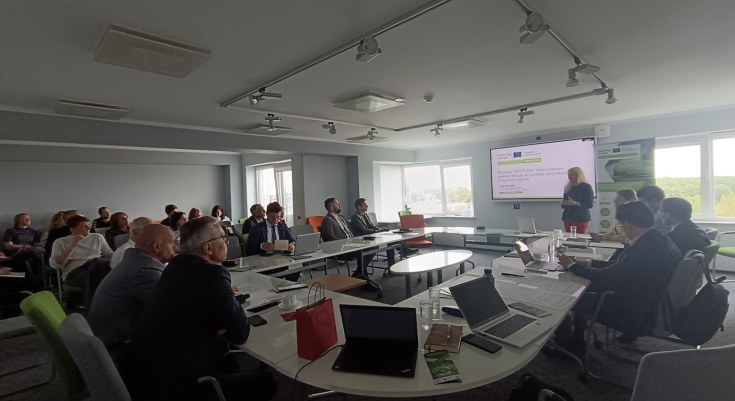The Future of Green Transport in Latvia

On 23 May 2025 in Riga, the Vidzeme Planning Region (VPR), together with Riga Technical University (RTU), organized a new SPOTLOG Regional Stakeholder Group Meeting where representatives from national and local governments, research institutions, and logistics companies discussed current issues in the development of environmentally friendly transport. Special attention was given to last-mile delivery – the transport of goods from the warehouse to the end consumer.
RTU researchers point out that the continued purchase of used, old trucks by companies signals not only inefficient business practices and challenges in the sector but also hampers the nationwide implementation of the green transition and negatively affects the achievement of policy goals.
Data from RTU experts show that Latvia’s freight vehicle fleet is significantly outdated compared to European averages, posing substantial challenges for both environmental protection and business sustainability.
Data from the Road Traffic Safety Directorate indicate that the transition to environmentally friendly technologies in the freight transport sector in Latvia is proceeding very slowly. Researchers note that the number of diesel-powered trucks continues to rise, contrary to broader European trends. The compiled data show that nearly half of all freight vehicles are between 10 and 20 years old on average, while one fifth are over 20 years old. Conversely, only one tenth of all freight vehicles registered in Latvia are younger than two years. The persistence of this aging fleet creates significant challenges for both environmental sustainability and business efficiency. Researchers highlight that a freight vehicle subjected to intensive daily use typically wears out within six years.
During the event, the audience sparked a discussion by posing a rhetorical question: in the long term, is it more efficient to operate a single old vehicle or multiple new ones, considering the overall emissions from both production and operation?
The challenges and solutions identified during the meeting and research clearly demonstrate that Latvia requires a coordinated approach integrating technological solutions, infrastructure development, policy support, and business incentives to effectively reduce emissions and foster sustainable transport development, especially in last-mile deliveries.
Zane Pīpkalēja, expert of the SPOTLOG project at Vidzeme Planning Region, emphasized that last-mile deliveries are rapidly increasing in Latvia and represent one of the most significant sources of CO₂ emissions. Approximately 51% of residents in Latvia choose home delivery, while the European average is around 76%. This difference is partially explained by the widespread availability of parcel terminals.
As Z. Pīpkalēja pointed out, a challenge in Latvia is organizing mobility flows, as railway stations and bus terminals are often located in different places, complicating convenient connectivity.
Dr.oec. Valērijs Skribāns presented six main groups of solutions to promote the green transition in Latvia’s transport sector:
- Replacement of vehicle fleets with alternative vehicles
- Development of hydrogen technologies in freight transport
- Wider use of biofuels in traditional transport
- Changes in transport structure, including development of public transport
- Improving efficiency of existing vehicles
- Combined implementation of these measures.
Experts note that countries with active political and financial support for electric vehicle adoption and strict emission standards progress faster. Latvia needs a similar policy to reduce the old, polluting vehicle fleet and accelerate the introduction of new, environmentally friendly technologies, especially in freight transport.
Fiscal and tax strategy challenges in the transition to green transport were outlined by RTU researcher Dr.oec. Māris Jurušs, who emphasized that declining excise tax revenues from traditional fuels can pose significant budgetary risks.
In a study presented by RTU researcher Ph.D. Aleksandrs Kotļars, 184 European companies, mainly in the manufacturing sector, were surveyed regarding criteria for selecting logistics services. The data show that the highest attention is given to service price and company reputation, while environmentally friendly service was mentioned as a selection factor in only 4% of cases. However, there is a group of companies for which environmentally friendly service is very important: those operating in international markets, required to comply with stricter environmental requirements, and actively participating in European Union-funded projects.
